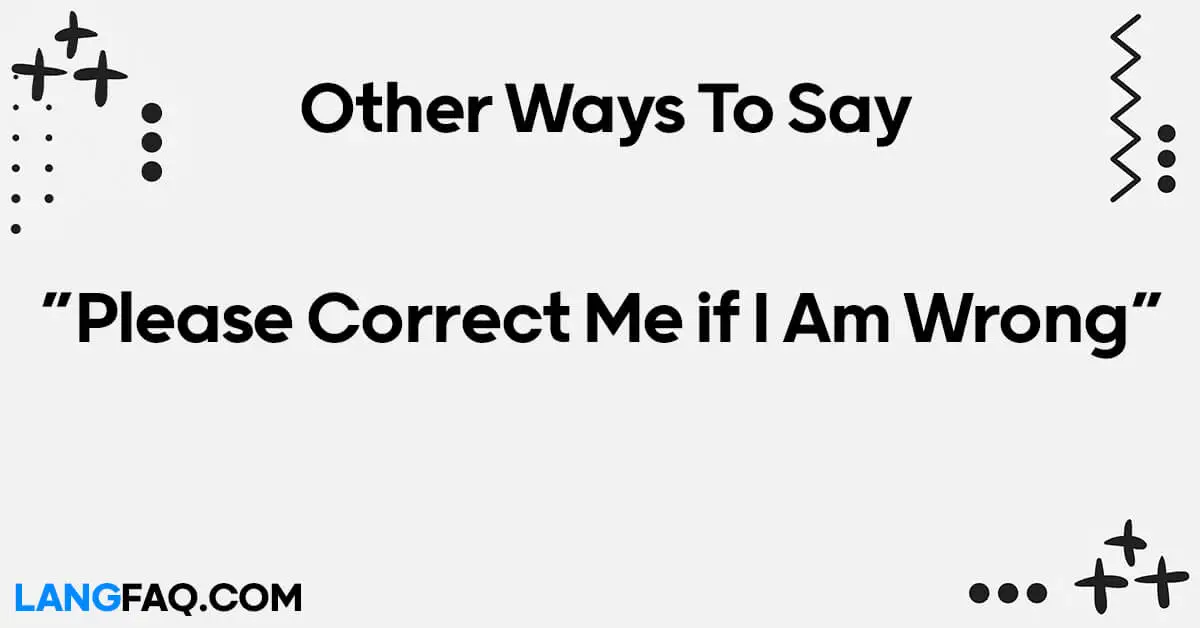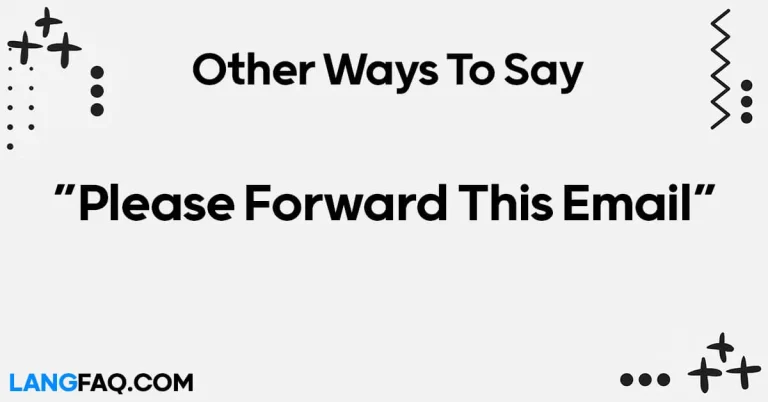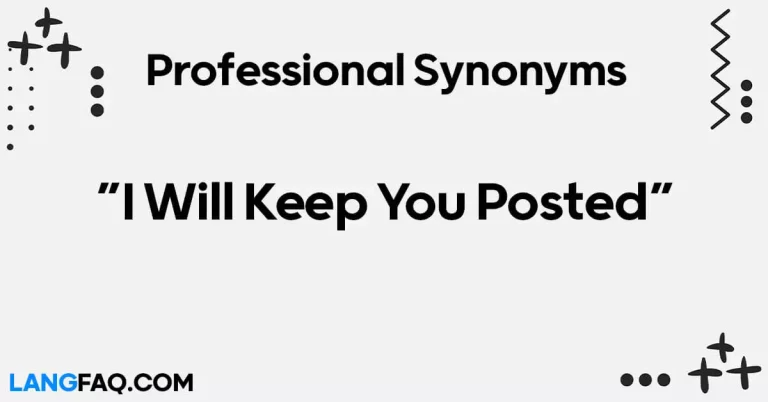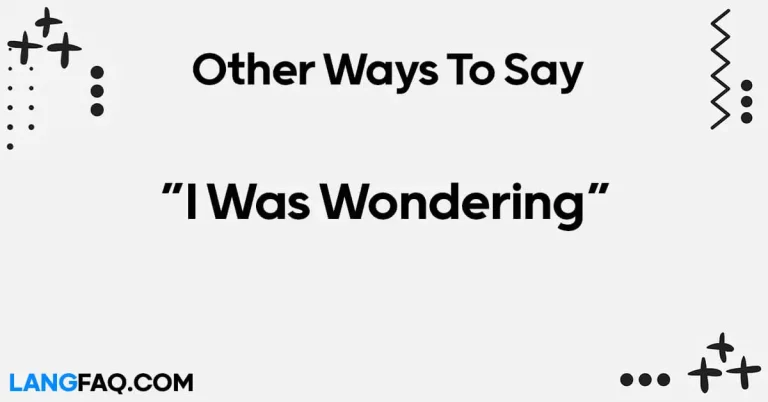In the realm of effective communication, the ability to gracefully acknowledge potential errors is crucial. This article delves into 12 alternative ways to express “Please Correct Me if I Am Wrong,” providing insights that not only refine your language but also enrich your conversational repertoire.
12 Other Ways to Say “Please Correct Me if I Am Wrong”
Here are 12 alternative ways to express “Please Correct Me if I Am Wrong” in English:
- Kindly point out any errors.
- Feel free to correct me.
- I welcome your corrections.
- Your feedback is appreciated.
- If I’m mistaken, please let me know.
- Correct me if I’ve misunderstood.
- I’m open to being corrected.
- I value your input for accuracy.
- Please clarify if I’m wrong.
- I’m receptive to your corrections.
- Your insights are crucial for accuracy.
- Let me know if I’ve made a mistake.
Here’s a table with meanings and examples for the 12 alternative ways to express “Please Correct Me if I Am Wrong”:
| Expression | Meaning | Example |
|---|---|---|
| Kindly point out any errors. | Politely ask for correction. | “Kindly point out any errors in my understanding.” |
| Feel free to correct me. | Give permission for correction. | “Feel free to correct me if I’m mistaken.” |
| I welcome your corrections. | Express openness to being corrected. | “I welcome your corrections to improve my work.” |
| Your feedback is appreciated. | Acknowledge the value of correction. | “Your feedback is appreciated for its guidance.” |
| If I’m mistaken, please let me know. | Politely ask for clarification. | “If I’m mistaken, please let me know the correct information.” |
| Correct me if I’ve misunderstood. | Indicate readiness for correction. | “Correct me if I’ve misunderstood the key points.” |
| I’m open to being corrected. | State a general openness to correction. | “I’m open to being corrected for better accuracy.” |
| I value your input for accuracy. | Emphasize the importance of correction. | “I value your input for accuracy in our project.” |
| Please clarify if I’m wrong. | Request clarification for potential errors. | “Please clarify if I’m wrong about the deadline.” |
| I’m receptive to your corrections. | Express willingness to accept correction. | “I’m receptive to your corrections to improve my skills.” |
| Your insights are crucial for accuracy. | Highlight the importance of correction. | “Your insights are crucial for accuracy in our findings.” |
| Let me know if I’ve made a mistake. | Encourage pointing out errors. | “Let me know if I’ve made a mistake in the calculations.” |
These alternative expressions provide a range of polite and open ways to invite correction and feedback. Choosing the right phrase can foster effective communication, creating an environment where corrections are viewed as opportunities for improvement rather than as criticisms.
Is It Correct to Say “Please Correct Me if I Am Wrong”?
Yes, the phrase “Please correct me if I am wrong” is grammatically correct and commonly used. This expression is a polite way to invite others to point out any errors or inaccuracies in your statements, actions, or understanding of a particular subject. It demonstrates humility and a willingness to learn and improve.
The sentence is structured as follows:
- “Please”: A polite expression used to make a request.
- “Correct me”: The main action, indicating the desire for someone to point out any mistakes.
- “if I am wrong”: A conditional clause specifying the condition under which the action should be taken. In this case, the condition is being incorrect or mistaken.
This phrase is appropriate in various contexts, such as professional communication, academic discussions, or everyday conversations. It creates an open and respectful atmosphere, encouraging others to provide constructive feedback without causing offense.
Example Usage:
- In a Meeting: “As we discuss the budget projections, please correct me if I am wrong about the revenue forecasts.”
- Academic Setting: “During the seminar, feel free to correct me if I am wrong in my interpretation of the research findings.”
- Everyday Conversation: “I believe the event starts at 7 PM, but please correct me if I am wrong about the timing.”
Professional Mail Example With “Please Correct Me if I Am Wrong”
Subject: Seeking Your Insight on Project Timeline
Dear [Recipient’s Name],
I trust this email finds you well. As we delve into the finalization of the project timeline, I’ve outlined key milestones and deadlines based on our discussions. However, I recognize the importance of accuracy in our planning.
Please take a moment to review the attached document and provide your feedback. Your expertise in project management is invaluable, and I want to ensure that our timeline aligns with your expectations.
Please correct me if I am wrong about any of the deadlines or if there are aspects that need adjustment. Your insights will contribute significantly to the success of our project.
Thank you in advance for your time and collaboration. I look forward to your feedback.
Best regards, [Your Full Name] [Your Position] [Your Company] [Contact Information]
Kindly Point Out Any Errors
In the pursuit of fostering effective communication, the phrase “Kindly point out any errors” stands as an invitation to constructive criticism. This expression is versatile, suitable for both formal and informal contexts. In professional settings, it’s a polite way to request feedback on work, projects, or presentations. When seeking feedback from friends, it maintains a courteous tone in personal relationships.
Example Sentence: “Kindly point out any errors in my proposal; your insights are crucial for its success.”
Email Sample:
Subject: Seeking Your Valuable Input
Dear [Recipient],
I hope this message finds you well. I have recently worked on a project proposal and would appreciate it if you could kindly point out any errors or areas that need improvement. Your insights are valuable to me, and I believe your feedback will contribute significantly to the success of this proposal.
Thank you in advance for your time and assistance.
Best regards, [Your Name]
Variation:
- Colleague: “Could you kindly point out any errors in the quarterly report I’ve prepared?”
- Friend: “Hey, I’m working on a blog post; could you take a look and kindly point out any errors?”
Feel Free to Correct Me
“Feel free to correct me” is an open invitation that promotes a relaxed and collaborative atmosphere. It works well in professional settings, signaling humility and openness to improvement. In casual conversations, it maintains a friendly and approachable tone, ensuring that correction is perceived as a positive contribution.
Example Sentence: “Feel free to correct me if there are any inaccuracies in the data I presented.”
Email Sample:
Subject: Request for Feedback
Dear [Recipient],
I trust this email finds you well. I’ve drafted the initial version of the report, and I would appreciate it if you could feel free to correct me on any points that may need adjustment. Your expertise is valuable to me, and I want to ensure the accuracy of our findings.
Thank you for your time and collaboration.
Best regards, [Your Name]
Variation:
- Mentor: “Feel free to correct me if you notice any gaps in the research plan.”
- Friend: “I’m trying out a new recipe; feel free to correct me if I miss any steps.”
I Welcome Your Corrections
Expressing a willingness to receive corrections with “I welcome your corrections” adds a layer of sincerity to the request. This phrase is suitable for both formal and informal communication, emphasizing the value placed on the input of others.
Example Sentence: “In this collaborative environment, I welcome your corrections to ensure the accuracy of our findings.”
Email Sample:
Subject: Seeking Your Expertise
Dear [Recipient],
I hope this message finds you well. As we work on the upcoming project together, I wanted to let you know that I welcome your corrections and insights. Your expertise is crucial to our success, and I am open to any suggestions you may have.
Looking forward to our continued collaboration.
Best regards, [Your Name]
Variation:
- Manager: “As we review the team’s performance, I welcome your corrections.”
- Friend: “Planning a surprise party; I welcome your corrections on the guest list.”
Your Feedback Is Appreciated
Acknowledging the value of correction, “Your feedback is appreciated” is a courteous way to solicit input. It can be effectively used in professional emails, team discussions, or even among friends when seeking opinions or suggestions.
Example Sentence: “As we finalize the marketing strategy, your feedback is appreciated to ensure its effectiveness.”
Email Sample:
Subject: Request for Your Input
Dear [Recipient],
I trust you’re doing well. As we approach the final stages of our project, your feedback is appreciated. Your unique perspective is valuable, and I believe it will contribute significantly to the project’s success.
Thank you for your time and consideration.
Best regards, [Your Name]
Variation:
- Team Member: “Your feedback is appreciated as we refine the sales presentation.”
- Friend: “Thinking of redecorating my living room; your feedback is appreciated on color choices.”
If I’m Mistaken, Please Let Me Know
This phrase delicately introduces the possibility of error, making it suitable for situations where precision is crucial. It’s commonly used in formal communication, such as in business emails, reports, or academic discussions.
Example Sentence: “In the financial report, I’ve estimated the projections, but if I’m mistaken, please let me know.”
Email Sample:
Subject: Seeking Clarification
Dear [Recipient],
I hope this message finds you well. As I review the project timeline, if I’m mistaken in any of the deadlines or milestones, please let me know. I want to ensure accuracy in our planning.
Your cooperation is highly appreciated.
Best regards, [Your Name]
Variation:
- Researcher: “In the experiment details, if I’m mistaken, please let me know.”
- Friend: “Planning a road trip; if I’m mistaken about the directions, please let me know.”
Correct Me If I’ve Misunderstood
This expression is apt when seeking clarification to avoid misunderstandings. It is formal in tone and can be used in professional communication, academic discussions, or any scenario where precise understanding is crucial.
Example Sentence: “I’ve read the client’s requirements, but correct me if I’ve misunderstood any key points.”
Email Sample:
Subject: Clarification Needed
Dear [Recipient],
I trust you are doing well. As we delve into the project details, correct me if I’ve misunderstood any aspects of the client’s expectations. Clarity is key to our success, and I want to ensure we are on the same page.
Thank you for your attention to this matter.
Best regards, [Your Name]
Variation:
- Student: “In the lecture notes, correct me if I’ve misunderstood any concepts.”
- Friend: “Planning a surprise party; correct me if I’ve misunderstood the preferences.”
I’m Open to Being Corrected
In situations where collaboration and open communication are paramount, “I’m open to being corrected” fosters an environment where team members feel comfortable providing input. It’s suitable for professional settings and team discussions.
Example Sentence: “As we brainstorm ideas, I’m open to being corrected to ensure the success of our project.”
Email Sample:
Subject: Open for Input
Dear [Recipient],
I hope this email finds you well. As we work together on the upcoming project, I want to emphasize that I’m open to being corrected. Your insights are valuable, and I believe this collaborative approach will lead to the best outcomes.
Thank you for your cooperation.
Best regards, [Your Name]
Variation:
- Manager: “In our team meetings, I’m open to being corrected on any strategy points.”
- Friend: “Planning a hiking trip; I’m open to being corrected on the trail details.”
I Value Your Input for Accuracy
Emphasizing the importance of input, “I value your input for accuracy” communicates a sense of collaboration and mutual respect. This phrase is suitable for professional contexts, especially when working with colleagues or team members.
Example Sentence: “As we finalize the budget report, I value your input for accuracy in the financial details.”
Email Sample:
Subject: Seeking Your Expertise
Dear [Recipient],
I trust you’re doing well. As we collaborate on the upcoming project, I want to express that I value your input for accuracy. Your expertise in this matter is crucial, and I believe it will contribute significantly to the success of our efforts.
Thank you for your time and collaboration.
Best regards, [Your Name]
Variation:
- Team Member: “In our strategy meetings, I value your input for accuracy in market analysis.”
- Friend: “Planning a group vacation; I value your input for accuracy in choosing the destination.”
Please Clarify If I’m Wrong
When seeking precision in communication, “Please clarify if I’m wrong” is a direct yet polite request for correction. It is suitable for professional contexts, academic discussions, or any scenario where accuracy is paramount.
Example Sentence: “In the project timeline, I’ve marked the milestones, but please clarify if I’m wrong.”
Email Sample:
Subject: Request for Clarification
Dear [Recipient],
I hope this message finds you well. As we finalize the details of the project timeline, please clarify if I’m wrong in any of the deadlines or milestones. Your insights are crucial to our success.
Thank you for your attention to this matter.
Best regards, [Your Name]
Variation:
- Researcher: “In the experiment protocol, please clarify if I’m wrong in any of the steps.”
- Friend: “Planning a dinner party; please clarify if I’m wrong about dietary preferences.”
I’m Receptive to Your Corrections
Expressing a proactive willingness to receive corrections, “I’m receptive to your corrections” conveys a positive attitude towards improvement. This phrase is suitable for various settings, promoting open communication in both professional and personal relationships.
Example Sentence: “As we review the project strategy, I want to emphasize that I’m receptive to your corrections for optimal outcomes.”
Email Sample:
Subject: Open for Feedback
Dear [Recipient],
I trust you are well. As we navigate the complexities of our project, I want to make it clear that I’m receptive to your corrections. Your insights are valued, and I believe this collaborative approach will lead to our collective success.
Thank you for your cooperation.
Best regards, [Your Name]
Variation:
- Colleague: “In our team discussions, I’m receptive to your corrections on our approach.”
- Friend: “Planning a joint venture; I’m receptive to your corrections on the business plan.”
Your Insights Are Crucial for Accuracy
Highlighting the significance of received insights, “Your insights are crucial for accuracy” is a gracious way to encourage correction. It is suitable for professional contexts, team discussions, or any scenario where precision is vital.
Example Sentence: “As we analyze the market trends, your insights are crucial for accuracy in our strategic planning.”
Email Sample:
Subject: Seeking Your Expertise
Dear [Recipient],
I trust this message finds you well. As we delve into the details of our project, I want to emphasize that your insights are crucial for accuracy. Your expertise is highly valued, and I believe it will significantly contribute to the success of our endeavors.
Thank you for your collaboration.
Best regards, [Your Name]
Variation:
- Team Member: “In our product development phase, your insights are crucial for accuracy in design.”
- Friend: “Planning a surprise event; your insights are crucial for accuracy in coordinating the details.”
Let Me Know If I’ve Made a Mistake
Offering an open invitation for correction, “Let me know if I’ve made a mistake” conveys a sense of humility and a desire for improvement. It is versatile, suitable for both professional and personal contexts.
Example Sentence: “In the project presentation, I’ve covered the key points, but let me know if I’ve made a mistake.”
Email Sample:
Subject: Request for Review
Dear [Recipient],
I hope this email finds you well. As we approach the final stages of our project, I invite you to review my work and let me know if I’ve made any mistakes. Your feedback is crucial, and I appreciate your time and attention to this matter.
Thank you for your collaboration.
Best regards, [Your Name]
Variation:
- Supervisor: “In the draft proposal, let me know if I’ve made any mistakes in the financial projections.”
- Friend: “Planning a weekend getaway; let me know if I’ve made any mistakes in the travel plans.”
FAQs
How can I politely ask for correction? Politeness is key. You can use phrases like “Your insights are valued” or “I appreciate your guidance” to solicit correction politely.
Why is it important to acknowledge potential mistakes? Acknowledging mistakes fosters a culture of transparency and continuous improvement. It demonstrates humility and a commitment to personal and professional growth.
Can language refinement improve communication skills? Absolutely. Using phrases like “Help me refine my understanding” promotes effective communication by showing a willingness to enhance language skills.
What is the significance of team collaboration in accuracy? Team collaboration emphasizes shared responsibility for correctness. Expressions like “Our collaboration ensures accuracy” highlight the collective effort in maintaining precision.
How do inclusive language and correction requests go hand in hand? Inclusive language fosters a sense of unity in correction requests. Phrases like “Let’s collaborate on accuracy” emphasize the collective pursuit of correctness.
Is embracing constructive criticism beneficial? Yes, constructive criticism is a powerful tool for personal and professional development. Expressing receptiveness to it shows a dedication to growth.
Conclusion
In the tapestry of effective communication, the ability to seek and accept correction gracefully is a skill that propels individuals and teams toward excellence. The diverse phrases explored here offer a palette of options to express the sentiment of “Please Correct Me if I Am Wrong” with eloquence and openness. Remember, communication is not just about conveying information; it’s about fostering understanding and growth.







